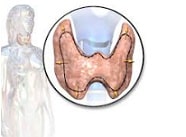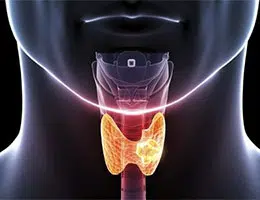 Hyperthyroidism is a disorder characterized by an increase in the function of the thyroid , an endocrine gland that is responsible for regulating metabolism and the body's sensitivity to various hormones. When the thyroid functions in excess, hyperthyroidism occurs, responsible for various health problems.
Hyperthyroidism is a disorder characterized by an increase in the function of the thyroid , an endocrine gland that is responsible for regulating metabolism and the body's sensitivity to various hormones. When the thyroid functions in excess, hyperthyroidism occurs, responsible for various health problems.
Subacute thyroiditis , toxic multinodular goiter , toxic thyroid adenoma , Graves-Basedow disease , and certain drugs can cause hyperthyroidism. The doctor must determine the etiology of the disorder through the study of symptoms and signs, thus being able to reach a diagnosis and thus determine what is the best treatment for the patient.
Excessive production of thyroid hormones results in a general increase in metabolism , with greater energy expenditure and oxygen consumption. This metabolic imbalance can cause weight loss, hair loss, arrhythmia , muscle weakness, nervousness, tremors, anxiety and insomnia, for example.
A key test for diagnosing hyperthyroidism is performing a blood test to measure the level of thyroxine , or T4 , a thyroid hormone. When this hormone appears in an excessive amount, it reveals the existence of hyperthyroidism.
With hyperthyroidism already diagnosed, treatment may include the administration of antithyroid drugs (which block the synthesis and release of thyroid hormones) or radioactive iodine and partial or total removal of the thyroid through surgery .
In this framework, there are three different types of treatments: conservative , surgical and radioactive iodine , which are detailed below. The first consists of the use of medications called antithyroids , mentioned in the previous paragraph, which are administered orally and can offer improvements within a maximum period of two weeks, although in some cases the symptoms are reversed in just seven days. This group of drugs that inhibit hormone formation includes carbimazole, methimazole and propylthiouracil.
 If the condition includes Graves-Basedow disease , then it is possible to try a longer treatment, lasting between one and two years, using antithyroid drugs exclusively or combined with thyroxine , thanks to which hypothyroidism can be avoided. . Throughout the treatment, the patient must attend a check-up every three or four months, in which it is necessary to check that there are no side effects of the drugs, such as skin reactions and a decrease in white blood cells.
If the condition includes Graves-Basedow disease , then it is possible to try a longer treatment, lasting between one and two years, using antithyroid drugs exclusively or combined with thyroxine , thanks to which hypothyroidism can be avoided. . Throughout the treatment, the patient must attend a check-up every three or four months, in which it is necessary to check that there are no side effects of the drugs, such as skin reactions and a decrease in white blood cells.
With respect to surgical treatment , it is intended for cases that do not definitively resolve and those that arise as a consequence of nodular goiters (increase in the size of the nodules). When the nodules grow too large, it causes compression symptoms or impairs vision, which is typical of Graves-Basedow disease. This procedure focuses on removing a fraction of the thyroid so that the gland is smaller and generates fewer hormones.
If the goiter is not considerable or the risk of surgery is too high, then it is recommended to resort to the administration of radioactive iodine orally, the effects of which can begin to be appreciated after the first month of treatment. It is important to note that this alternative usually causes hypothyroidism and impairs vision even more than surgery . To treat hypothyroidism, on the other hand, thyroxine tablets should be prescribed, which are consumed orally.
It should be noted that hyperthyroidism can also affect other species . It is common, to cite one case, among elderly domestic cats, who suffer from tachycardia , stomach problems and sudden weight loss.
